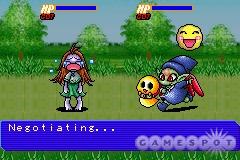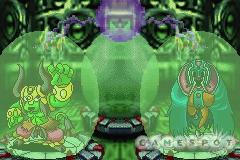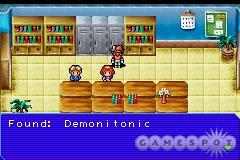Atlus is a company that has a reputation for bringing games over to North America from Japan that other companies might not give a second glance. The company's bread and butter seems to be tactical simulations and role-playing games with supernatural subplots or quirky gameplay mechanics that you won't often find in mass-market games. DemiKids for the Game Boy Advance certainly fits right in with this pattern. Originally called Shin Megami Tensei: Devil Children 2 in Japan, DemiKids is a dark, Pokémon-style role-playing game that lets you go into battle not with a gaggle of cute, cuddly monsters, but with a horde of ugly, dangerous demons. For various reasons, DemiKids doesn't stack up all that well against Nintendo's Pokémon games in terms of variety, fun, or overall cohesiveness, but it is decent enough to provide most players with a healthy 10 to 20 hours of play time.

The story centers around two students, Jin and Akira, who live in an Earth-like place called Rem. Jin and Akira are DemiKids--part-human, part-demon beings that can control and raise demons. Unfortunately, at the exact moment their powers awaken, everything goes haywire. A time rift opens up on the roof of the school, demons start appearing in Rem, and their friend Lena is taken to another dimension by an ugly dragon. It's not long before the pair discovers the real cause of these calamities: An evil demon named Imperius has opened numerous time rifts in his bid to take over two other worlds--Valhalla and Dem. In order to stop Imperious and restore order to Rem, Jin and Akira need to gather the time chains and confront Imperious. Depending on which version of the game you play, light or dark, you'll control Jin as he travels through Valhalla or Akira as he wanders through Dem.
DemiKids shares so much in common with Pokémon that it's obvious the designers intended for the game to be a supernaturally themed alternative to Nintendo's G-rated series. You take control of a trainer, called a "DemiKid," and set out into the world to recruit monsters to be used in battle. Each monster, or "demon," as the game calls them, has its own set of attacks, magic, and skills. The demons in DemiKids also have elemental characteristics--such as fire, water, ice, dark, and light--just like the monsters in Pokémon do. You can have up to three demons on the battlefield at one time, but a device called a "loc" allows you to have up to nine more ready to jump in if one of your main monsters is knocked out. The additional demons you recruit are stored in a portable computer called a "vinecom," which, much like the Pokédex in Pokémon, also functions as an inventory for the items you get and as a demon dictionary that keeps track of all the demons you've discovered.

One way DemiKids distinguishes itself from Pokémon is in how the story is split between the two versions of the game. DemiKids is available in two flavors: light and dark. Both games overlap at key points in the story, but each game is set in a different world with a different cast of characters. The light version is set in a lush realm full of greenery, called Valhalla, while the dark version takes place in a hell-like realm called Dem. Each world has its own unique array of demons, items, and cinema scenes, so the only way to collect all 350-plus demons and experience the complete story is to play through both games.
DemiKids also earns credit for originality for the manner in which you capture and evolve the creatures you collect. Instead of tossing Pokéballs at wild monsters, the demons in your party negotiate with the demons you encounter on the battlefield. The outcome typically depends on the way the two demons stack up in terms of strength and elemental affinity, although there are times when you have to part with money or items in order to seal the deal. The demons in DemiKids also don't evolve in the same fashion as the monsters in Pokémon do. In order to create a stronger demon, you literally have to fuse two weaker demons together. That means you lose both of the original monsters in the process.
Compared with other role-playing games, DemiKids guides you through its single-player story mode at a supersonic pace. You can travel as much as you like between any of the 20 or so different locations in each game, but there's rarely ever a reason to backtrack once you've beaten the next boss or witnessed the latest story progression. What mainly prevents you from flat-out running from one village to the next is the random battles that occur when you're out in the wild. Combat is repetitive, as it is in any RPG, and you'll spend a fair amount of time instructing your demons to attack the other demons you run across. Usually, the first few demons you encounter in a new area are stronger than those in your possession, so you'll also find yourself taking the time to recruit them into your party so you can go back to town and fuse your demons into stronger hybrids.

In the beginning, it's rather interesting to see what you can create by joining two different monsters together. Over time, however, the process becomes boring and forced. The fusion system just doesn't inspire the same level of attachment that an experienced-based system, like that in Pokémon, does. The monsters in Pokémon earn experience for every battle and evolve once they achieve a certain level. That gives you incentive to stick with a particular monster throughout the game and to learn its unique strengths and weaknesses. In DemiKids, you hardly spend any time controlling one demon before you've mashed it together with another.
To be fair, you don't have to rush through the game if you don't want to. There are a handful of side quests to complete and a few casinos here and there that allow you to earn cash playing about a dozen different card and puzzle games. Battlenets in each village let you participate in solo battles and tournaments against CPU opponents. The reward for completing a side quest or gaining rank in a tournament is often a rare demon that you can't find in the wild or create at a fusion center. DemiKids also supports the use of the GBA link cable for two-player matches as well as link-exclusive fusions. In a link fusion, player one and player two select one demon to fuse with the other player's demon. The end result is a new demon for both players.
Even though Atlus has localized only four of the dozen or so Megami Tensei games into English, the series has a devoted following here in North America, mainly because of the occult-themed stories and manga-style artwork that accompany each game. While the language in DemiKids has been cleaned up a bit from its Japanese counterpart, the story is still deeply supernatural in nature, and all of the mature events that take place in the Japanese version happen just the same in the English version. Fans of Shin Megami Tensei, and of Japanese comic art in general, will enjoy the demon designs and character artwork shown in the game's battle and cinematic sequences.

Beyond the Japanese-tinged overtones, DemiKids is pretty much average compared to other role-playing games with respect to graphics and audio. The overhead graphics consist of tiny characters with large heads walking through areas that don't show much in the way of animation. Once in a while, you'll see flames wavering off a torch or a shimmer reflecting off a pool of water, but that's about it. The environment doesn't have many active features in it, such as moving rivers or drifting clouds--the kinds of things done so beautifully in games like Golden Sun 2 or The Legend of Zelda: A Link to the Past--but that's a complaint that also holds true for many other RPGs on the GBA. As for the audio, it does its job. There are various sound effects for each type of attack, and the music fits right in with what happens onscreen, even if it is somewhat overdramatic.
Overall, DemiKids has its fair share of ups and downs. It's not the best role-playing game available for the system, but it does provide an alternative to the more upbeat Pokémon and Mega Man Battle Network games.